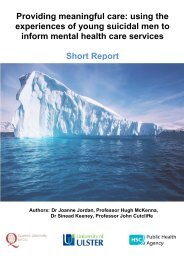Saving Mothers' Lives: - Public Health Agency for Northern Ireland
Saving Mothers' Lives: - Public Health Agency for Northern Ireland
Saving Mothers' Lives: - Public Health Agency for Northern Ireland
Create successful ePaper yourself
Turn your PDF publications into a flip-book with our unique Google optimized e-Paper software.
Annex 13.1 The recommendations of the National Domestic Abuse<br />
and Pregnancy Advisory Group 1<br />
The Advisory Group’s terms of reference were:<br />
“To advise Ministers on the practicalities of taking <strong>for</strong>ward the commitment in the Children’s,<br />
Young People’s and Maternity NSF (National Service Framework) to provide a supportive and<br />
enabling environment within antenatal care <strong>for</strong> women to disclose domestic abuse.”<br />
An enabling environment is defi ned as:<br />
“An environment which ensures, at the very least, that all pregnant women know about the<br />
nature and frequency of domestic abuse, that those affected need not suffer in silence and will<br />
be listened to sympathetically, and all women are given in<strong>for</strong>mation on how to access local and<br />
national sources of support and advice.”<br />
Recent NHS re<strong>for</strong>ms were designed to meet the needs of patients more effectively. One outcome has been<br />
a shift of emphasis from Whitehall to the NHS frontline. It is the responsibility of local authorities, managers<br />
and professionals to set priorities in the light of their resources and the needs of their populations. The role<br />
of the Department of <strong>Health</strong> (DH) is to set out a clear national framework whilst providing resources, setting<br />
standards and looking at accountability.<br />
Action points <strong>for</strong> local activity<br />
1. Material concerning domestic abuse should be provided that meets the needs of the local population<br />
in a variety of easily accessible <strong>for</strong>mats and media. Support should be available from the start in easy<br />
access <strong>for</strong>mats <strong>for</strong> all, including in different languages and easy read <strong>for</strong>mat.<br />
2. The numbers and website addresses of the national and local helplines should be automatically printed<br />
at the bottom of all NHS appointment cards and any other locally produced in<strong>for</strong>mation.<br />
3. The national and local helpline numbers should be printed on local hand held maternity and child health<br />
records as well as being made available in clinics by means of posters, videos etc.<br />
4. New mothers to receive, as part of their baby record book, a laminated card with a complete list of<br />
useful national and local numbers of organisations that can help them and their babies, such as access<br />
to breast feeding advice, welfare foods etc but which will also include the domestic abuse numbers.<br />
5. The national helpline numbers and website address should be printed on a standardised credit card<br />
sized leafl et freely available in clinics or elsewhere. These may be adapted <strong>for</strong> local use.<br />
6. Regular surveys should be carried out to ascertain how many women recalled seeing the in<strong>for</strong>mation, if<br />
they understood it and modifi cations made accordingly.<br />
7. Policies should be audited locally as part of the monitoring process tracking implementation of the<br />
Maternity Standard of the Children’s, Young People’s and Maternity NSF.<br />
8. NHS maternity services should move to include a routine question as part of the social history taken<br />
during pregnancy, but this should be introduced at a measured pace, and with appropriate training.<br />
179



